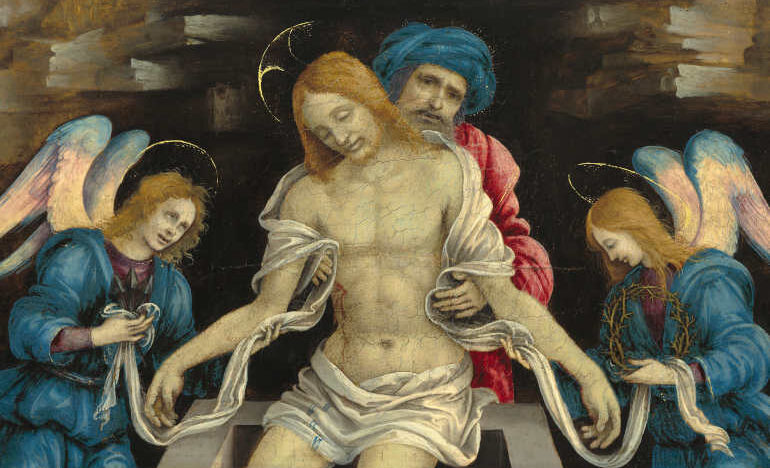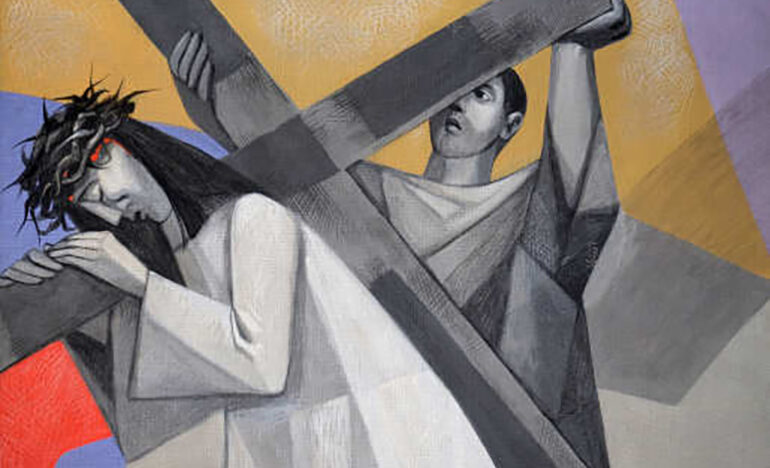The Gospel of Mark: The ‘secret epiphanies’ of Jesus

By Fr. Ron Will
Part 3 of 4. All the articles are here.
Author’s Note: During the 2021 liturgical year, we are reading from the Gospel of Mark at Sunday services. Let’s take time to study together the Jesus whom Mark reveals. Read these articles and join our mini-retreat. Details below.
According to Mark 1:12-15, after Jesus was baptized the Spirit drove him into the desert. As we prepare to be driven into the 40-Day Desert of Lent (Ash Wednesday is Feb. 17), I invite you to spend a couple hours of prayerful preparation by looking at Jesus through the eyes of St. Mark — who was actually looking at Jesus — through the eyes of Peter the Apostle. We will discover a Jesus who has something to say to us personally about our own situations at work, with family and in Church life.
Try to read the whole Gospel according to Mark in one sitting. It is only 16 chapters long, and it will take you less than two hours to read. It will give you a sense of the whole message that Mark is sharing. You will probably notice that Jesus is a person of action rather than of words. He moves quickly from place to place but always has compassion.
A significant idea found in Mark is the “secret manifestations” or “secret epiphanies” of Jesus; also referred to as the “Messianic secret.” Chapter 4:11 is the real key to the “Messianic secret.” Jesus has just related a number of parables, and his closest disciples “the Twelve questioned him about the parables.” Jesus tells them, “To you the mystery of the reign of God has been confided. To the others outside it is all presented in parables.”
Actually, “secret” is probably the wrong word here. It is really the full revealing that is to come. The parables are not self-evident explanations of the mystery of the kingdom of God for the non-initiated. Several of them need more than a little explanation. They are the vehicles of a revelation in mystery, in veiled allusion, demanding an explanation that Jesus reserves for the few.
Fr. Ron’s mini-retreat with Mark’s Gospel will be on Tuesday evening Feb. 9 or Saturday morning of Feb. 13.
From the first centuries of the Christian era, the silence that Jesus exercised was explained as a measure of prudence so that his mission might not be compromised by an ambiguity that could prove fatal. Popular messianism had taken on a political and seditious character, so that the mere name “Messiah” was enough to move the people to an erroneous enthusiasm about the real mission of Jesus, and at the same time provoke the suspicions of the established authority in the land.
The prophets had foretold that the Messiah would be a son of David and that his kingdom would last forever. He would come like a king, then, gloriously, and he would lead the Jews to victory over their enemies, over the hated Romans in the first place. He would set up his throne in Jerusalem. Palestine would be his kingdom, but as the center of a world empire, and all nations would serve the chosen people. Such were their grandiose expectations, based on a too-literal interpretation of the figurative language of the prophets, and intensified by the frustration of the long years of subjection.
Even the disciples shared these views. But the Messiah Jesus reveals in Mark’s Gospel is very different.
The Messiah in Mark’s Gospel would suffer and die for the sins of his people — a concept quite foreign to then-current Messianic ideas. It is significant that even when Isaiah chapter 53, sometimes called the “suffering servant song,” was interpreted as referring to the Messiah, the notion of suffering was explained away — a feat which called for no little ingenuity! Jesus knew well that if he openly claimed to be the Messiah, the people would look to him to take strong action, or they would reject him as an impostor.
If we want to understand the Gospel according to Mark, we must read it as a story that tells us about the religious meaning of Jesus. It does not intend to give us accurate historical information about the course of Jesus’ life. What it wants us to learn is “gospel truth,” not historical truth.
Once Mark had arranged independent traditions about Jesus’ acts and teachings into the format of a story climaxing with the passion, the Gospel writers who followed him could then give more attention to that kind of detail. The authors of both Matthew and Luke used Mark’s Gospel in writing their own. If you compare them, you will see how time and again these two authors smoothed out the rough places in Mark and gave the story a smoother flow.
Mark relates fewer of the words of Jesus than Matthew and Luke. He says often that “Jesus taught” without telling the content of his teaching. His narrative is more concerned with the deeds of Jesus, which he narrates with more incidental detail than Matthew or Luke. That Jesus is the Son of God is revealed less in dogmatic statements than in the exercise by Jesus of divine power: the forgiveness of sins, dominion over the Sabbath, the expulsion of demons, the knowledge of secrets, predictions.
As you read the Gospel according to Mark, write down every example of the “Messianic Secret” so that you can go back to it and discover and embrace the secret during our Mini-Retreat.
As we continue to observe social distancing, I invite you to a mini-retreat on the Gospel of Mark by means of Zoom. I invite you to nourish your souls by studying together God’s sacred word.
Information about how to register for the Mini-Retreat is on the Renewal Center website now. Click on the following links to learn more. It will be offered on Tuesday, February 9, 6:30 to 8:30 p.m. central time and offered again on Saturday, February 13, 10 a.m. to noon central time.
Note: Never miss an article published on the Renewal Center website: Sign up to receive our newsletters
[Fr. Ron Will, a Precious Blood priest and spiritual director, is a graduate of Catholic Theological Union and Creighton University’s School of Christian Spirituality. He has a special interest in helping form intentional disciples of Jesus, encouraging others to go spiritually deep-sea diving to explore a deeper relationship with God, and walking with people as they dive into the ocean of God’s mystery actually experiencing God rather than simply dipping one’s toe into the water.]
Image is “Pietà” or “The Dead Christ Mourned by Nicodemus and Two Angels,” c. 1500 by Filippino Lippi, part of the Samuel H. Kress Collection in the National Gallery of Art.
We’d Like to Hear From You!
We’d like to know what you think about this article. Send us a comment using the form below. Do you have a suggestion? Is there something you want to learn more about? Send us a note.
Related

What’s the Problem?
By Fr. Garry Richmeier, C.PP.S.
You can’t fix a relationship or a behavior like a mechanic fixes a car or a surgeon “fixes” a patient. Behaviors and relationships don’t have parts that can be fixed or replaced when the break or malfunction.

Lent Video Five – Meditation: “Only a Shadow of You Love”
Next Sunday is Palm Sunday and next week is Holy Week. In anticipation of those solemn commemorations, today, Fr. Ron will help us pray and meditate on the Stations of the Cross.
Categories
Assembling God's Puzzle Coffee with Padre Cooking & Spirituality Encounters of the 4th Kind Family Matters Reflections on the Eucharsitic Prayers Spiritual Resources Taize Prayers The Contemplative Life Traveling with Pilgrims of Hope Uncategorized Videos Week of Prayer for Uhristian Unity When you need a little help
